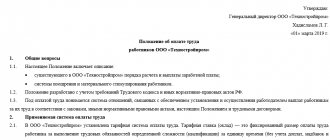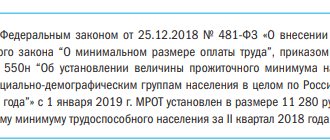Labor Code of the Russian Federation on salary advance for newcomers
There is no mention of salary advances for newcomers in labor legislation. At the same time, in Art. 136 of the Labor Code of the Russian Federation establishes the following requirements:
- salary payment - at least every six months;
- the specific date of payment is established in internal local acts, but no later than 15 calendar days from the end of the period for which it was accrued.
Find out how to reflect salary accruals in accounting in our publication.
Labor Code:
- calls all salary payments “salaries”, the term “advance” is not used;
- determines the minimum number of salary payments per month, each of which is not of an advance nature, but is calculated based on the time actually worked;
- establishes the maximum permissible calendar gap between the first and second parts of the salary;
- reserves the right for companies and individual entrepreneurs to determine the dates for issuing money and calculation algorithms.
Learn about employer rights from the article.
When to pay wages: what the law says
The employer must issue wages to employees at least twice a month (Article 136 of the Labor Code of the Russian Federation). The exact dates for the transfer of money are established by employment contracts and/or local regulations in force in the organization.
You need to pay wages at work at least once every six months. The advance (the first part of the salary) is transferred from the 16th to the last day of the current month. The deadline for payment of the second part of the salary is the 15th day of the month following the reporting month (i.e., the month in which the employee earned this salary).
If the established payday coincides with a weekend or holiday, the money must be transferred on the working day preceding it. It is impossible to pay wages later - at the first inspection, the labor inspectorate will reveal a violation, and the employer will be held administratively liable in the form of a fine.
We fix “salary” deadlines
Determine the dates of the first and second salary payments yourself. For example, you can set the numbers 30 (31) and 15 (16) respectively - officials consider this option optimal (letter of the Ministry of Health and Social Development of Russia dated February 25, 2009 No. 22-2-709).
Download the salary slip form here.
Don’t forget about newcomers - it is also important for them to set the deadline for their first salary, and it may not coincide with the dates established by the company.
Make a description of salary aspects in a local intra-company act - this could be PVTR (internal labor regulations), regulations on remuneration, collective agreement, etc.
The following publications will introduce you to internal local acts that include “salary” aspects:
- “Internal labor regulations - sample 2022”;
- “Regulations on incentive payments with performance criteria.”
See below for specific wording on how to set wages.
The first salary has a separate deadline
When formulating the text of the salary part of internal local acts, be guided by the following rules:
- The salary payment deadline is a specific day, not a calendar period (not a “fork” of dates). Rostrud insists on this.
Find out more here .
- Distribute the days for issuing the first and second parts of the salary so that every half month workers receive payment for their work. This is a requirement of Art. 136 Labor Code of the Russian Federation.
Choose convenient dates based on the specifics of the company’s work. This could be, for example, the 10th day (final payment for the previous month) and the 25th day (advance payment for the current month).
It should be taken into account that with this formulation, newcomers find themselves in a special position - persons who started work on one of the days of the billing month. It turns out that with salary payments on the 5th (calculation for the previous month) and on the 20th (advance for the current month), an employee who started work on the 1st needs to pay only the advance on the 20th. That is, the gap between the start of work and the date of payment of the advance is more than ½ month, which is a violation of the law. We will tell you what to do in such a situation below.
Advance and salary
According to Art. 136 of the Labor Code of the Russian Federation, salaries should be paid once every half month. The amount of the first half of the month is the advance payment. It must be paid, even if the employee himself wrote a refusal in writing, otherwise the employer will be fined under Art. 5.27 Code of Administrative Offenses (letter of Rostrud No. 472-6-0 dated 01/03/07). This rule also applies to part-time workers.
The legislator indicates: the employer is obliged to pay both parts of the salary (including the advance) no later than 15 days after the end of the corresponding accrual period, i.e. for an advance payment the deadline is the 30th, and for a salary – the 15th of the next month.
The dates of advance payment are recorded in the LNA. If the days coincide with a weekend or holiday, the advance must be issued a day earlier. The date of issue is one day; it is unacceptable to use a date interval in LNA (Ministry of Labor, document No. 14-2-242 dated 11/28/13).
Is it possible for an external part-time employee to pay wages once a month and not pay an advance?
Problems associated with the withholding of personal income tax may result from the establishment of deadlines for the issuance of wages, incl. advance amounts.
If the advance payment takes place on the last day of the month, the fiscal authorities may require withholding tax in accordance with the Tax Code of the Russian Federation.
The date of actual receipt of income is the last day of the month, this is the moment of withholding personal income tax (223-2, 226-4 of the Tax Code of the Russian Federation, defined by BC No. 09-KG16-1804 of 05/11/16).
If the advance was issued on the 15th, the salary must be issued at the end of the month and a settlement must be made with the employee, which is rarely possible to do. Moreover, if the transfer of income tax from an advance payment is recognized by the Federal Tax Service as unfounded, the amount will be returned to the taxpayer, since it is not considered a tax under the Tax Code of the Russian Federation.
The employer decides how to calculate the advance:
- In the form of a fixed amount (or percentage of salary).
- Based on the actual amount of work (or time worked).
Officials propose calculating the advance in proportion to the time worked, including in the calculation a number of permanent compensation payments, allowances, in addition to the basic salary, or calculating the advance as a percentage, it should be approximately equal to the amount of wages (according to letters of the Ministry of Labor and Rostrud No. 14-1/B -725 dated 10/08/17, T3/5802-6-1 dated 26/09/16, Ministry of Health and Social Development No. 22-2-709 dated 25/02/09).
Calculating time worked is a labor-intensive process. Often the advance is set equal to 40% of the amount of permanent earnings, which, taking into account personal income tax in the final calculation, gives comparable values for the first and second parts of the salary.
On a note! The Labor Code of the Russian Federation does not contain a ban on issuing advances more than once a month, for example, weekly, ten days.
Advances to newly hired employees - what and where do we prescribe?
Include the deadlines for advance payments to newly hired employees in the PVTR (or other local act) in one section describing the salary deadlines common to the entire team.
The following example can be used as a sample.
Example
At Tekhnostroyprom LLC, all salary nuances are reflected in the Regulations on Remuneration. Based on the modern wording of labor legislation, the company decided not to use the term “advance” and determined that salaries would be paid twice a month.
At the same time, for newcomers in the first month of work, special terms for payment of wages are provided, allowing:
- comply with the requirements of the Labor Code of the Russian Federation to pay wages at least every half month (more often is possible, less often is not possible);
- gradually (without prejudice to newcomers and the employer) transfer newcomers to the regular payment schedule provided by the company, without violating the requirements of labor legislation.
Excerpt from the Regulations on remuneration of Tekhnostroyprom LLC:
3.1. Salaries at Tekhnostroyprom LLC are paid:
- 20th day of the current month - for the 1st half of the billing month;
- 5th day of the next month - for the 2nd half of the billing month.
3.2. Deadlines for issuing salaries in the first month of work for newly hired employees:
| Calendar dates for employment | Deadline for first salary payment |
| From 1st to 14th | 15th - exclusively for newly hired employees |
| From the 15th to the 19th | 20th - at the same time as all employees |
| From the 20th to the end of the month | 5th - on the general deadline for salary payments |
3.3. Subsequent wage payments are made within the deadlines established by Tekhnostroyprom LLC, specified in clause 3.1.”
You can see the full text of the Regulations on remuneration of Tekhnostroyprom LLC at the link below:
Find out about local acts that help in your work from the following materials:
- «Regulations on business trips - sample»;
- “Regulations on the occupational safety and health management system - sample”;
- “Regulations for working with accounts receivable - sample”.
In addition to the deadlines, the local act may also contain an indication of the algorithm for calculating the amount of each salary payment, including the advance payment for the first month of work.
Advance payment as a prepayment to a newly hired employee
Payment of an advance in the form of prepayment for labor - as a method of calculation when hiring a new employee - for many legal reasons does not correspond to wages, because:
- In accordance with Art. 132 of the Labor Code of the Russian Federation, wages are set based on the “quantity and quality of labor expended.”
Obviously, the “quantity and quality” of work can only be assessed by the fact of its completion. In the case of the advance in question, such an assessment cannot be made.
- In accordance with Art. 136 of the Labor Code of the Russian Federation, when paying wages, the employer is obliged to issue pay slips to employees, which reflect the data on the basis of which wages are calculated. For example:
- number of hours worked;
- level of plan implementation;
- volume of work performed.
If the payment method when hiring is an advance payment, then the employer will not have the specified information. They cannot be determined even approximately, in the absence of data on the previous performance of the new employee. Departments do not recommend calculating wages without taking into account data on actual time worked and volume of work (letter from the Ministry of Labor dated 08/10/2017 No. 14-1/B-725, Rostrud dated 09/26/2016 No. T3/5802-6-1).
Thus, it is legitimate to say that prepayment for labor is not a de jure salary. But we note that some courts take the opposite position. For example, the Saratov Regional Court, in a decision dated June 27, 2016 in case No. 21-396/2016, indicated that the employer has the right to pay employees earlier than the established deadlines. Moreover, according to the Saratov Regional Court, an advance payment is a privilege that improves the employee’s position in comparison with the provisions enshrined in the law and local regulations.
Method for calculating advance payment when hiring
Establish in a local act the method for calculating the advance payment when hiring - it should not contradict the requirements of the law, which determines the calculation of the first and second salary payments based on the time actually worked.
Is it possible to set wages for the first half of the month at 40% of the salary and how to withhold personal income tax? You will find the answer to this question in ConsultantPlus. Get free access to the system and proceed to expert explanations.
It is impossible to establish an advance payment in a fixed amount for all employees - it is impossible to do without preliminary calculations.
In addition, you should take into account the requirements of legal acts and the opinion of officials regarding the minimum and maximum amounts of the advance:
| Advance amount | Opinion of officials and legislators | NPA |
| Minimum | The minimum amount of the advance must not be lower than the employee’s tariff rate for the time worked | Art. 129 Labor Code of the Russian Federation |
| Payment to an employee for half a month cannot be less than the tariff rate or salary for the time actually worked (the amount of work actually completed) | Letter of Rostrud dated 02/03/2016 No. 14-1/10/B-660 | |
| The advance is calculated on the basis of the salary (tariff rate) and bonuses to it (for part-time work, for work at night according to a schedule, etc.) Those payments that are determined based on the results of the completed month (bonus, overtime) should not be used when calculating the advance payment. | Letter of the Ministry of Labor of the Russian Federation dated August 10, 2017 No. 14-1/B-725 | |
| Maximum (not regulated by law) | It is necessary to calculate wages for every half month in approximately equal amounts (excluding bonus payments), since wages are paid at least twice a month | Letter of the Ministry of Health and Social Development of Russia dated February 25, 2009 No. 22-2-709 |
What amount should I pay to an employee who has just been hired?
Tax inspectors believe that an employee who has just been hired and worked only one day in the billing period already has the right to receive income for the first half of the month (Article 136 of the Labor Code of the Russian Federation). You just need to calculate his income in proportion to the time worked. And if you don’t pay, the employer can be punished and held accountable under Part 6 of Art. 5.27 Code of Administrative Offenses of the Russian Federation.
For example, the deadline for paying wages for the first half is the 30th (31st), payment of wages is on the 15th. Markov A. M. was hired on the 14th, for a position with a salary of 44,000 rubles. According to the production calendar, there are 22 working days in October. When determining the amount of income for the first half of the month, we will apply the conditions in proportion to the time worked for half the month. By the time of payment, two days have been worked, which means the payment amount will be 4,000 rubles. The employee will receive this amount on the 31st.
Since the situation with the hired employee is considered controversial, when determining the amount of earnings for the first half of the month, it is better to use a calculation proportional to the time worked.
The newcomer was not given an advance - what are the consequences?
There is no specific provision of law establishing liability for late payment of an advance to new employees or incorrect calculation of its amount.
However, an employer who deviates from legal requirements cannot avoid liability. In this situation, general rules apply, namely:
| Type of violation of labor laws | Type of responsibility | Punishment |
| Late payment (non-payment) of advance payment, wages | Administrative (Article 5.27 of the Administrative Code) | Primary violation - a fine for officials and individual entrepreneurs from 1,000 to 5,000 rubles, for a company - from 30,000 to 50,000 rubles; Repeated violation - a fine for officials and individual entrepreneurs from 10,000 to 20,000 rubles. or disqualification for a period of 1 to 3 years, per company - from 50,000 to 70,000 rubles. |
| Disciplinary (Article 192 of the Labor Code of the Russian Federation) | If the salary is not paid due to the fault of the manager (or other authorized person), this may be considered as improper performance of their official duties and lead to the imposition of one of the provisions provided for in Art. 192 of the Labor Code of the Russian Federation of disciplinary sanctions | |
| Material (Article 236 of the Labor Code of the Russian Federation) | The employer is obliged to pay (except for delayed wages) interest - not less than 1/150 of the key rate of the Central Bank of the Russian Federation in force at that time on amounts not paid on time for each day of delay, starting from the next day after the established payment deadline up to and including the day of actual settlement | |
| Criminal (Article 145.1 of the Criminal Code of the Russian Federation) | Partial non-payment of wages for more than 3 months, committed out of selfish or other personal interest by the head of an organization, an employer - an individual, the head of a branch, representative office or other separate structural unit of an organization, is punishable by a fine in the amount of up to 120,000 rubles, the salary or other income of the convicted person for the period up to 1 year, or deprivation of the right to hold certain positions or engage in certain activities for up to 1 year, or forced labor for up to 2 years, or imprisonment for up to 1 year. Complete non-payment of wages for more than 2 months (or payment of wages for more than 2 months in an amount below the minimum wage established by federal law, committed out of selfish or other personal interest by the head of the organization, the employer - an individual, the head of a branch, representative office or other separate structural unit of the organization - punishable by a fine in the amount of 100,000 rubles to 500,000 rubles or in the amount of wages or other income of the convicted person for a period of up to 3 years, or by forced labor for a period of up to 3 years with deprivation of the right to hold certain positions or engage in certain activities for a period of up to 3 years or without it, or imprisonment for up to 3 years with deprivation of the right to hold certain positions or engage in certain activities for up to 3 years or without it |
An employer cannot avoid punishment if an employee asks for a salary in one amount once a month and his request is not denied (letter of Rostrud dated November 30, 2009 No. 3528-6-1). You can see detailed explanations of this position from an official from the Ministry of Labor in K+, having received free trial access to the system.
If your employee asks to pay him an advance payment several months in advance, and you meet him halfway, arrange such payment in the form of a loan with a minimum interest rate. Otherwise, you may have all sorts of problems: the advance may be considered an interest-free loan (the need to withhold personal income tax from the amount of the benefit from saving on interest), and you will have to immediately pay insurance premiums, etc., on the entire amount.
An employer who has not paid an employee (new or long-time) for the first half of the month will not be punished only if this employee did not work in the first half of the month (appeal ruling of the Moscow Regional Court dated 08/07/2012 in case No. 33-15891 /2012).
Results
Newcomers must receive their first salary payment no later than 2 weeks after starting work. All subsequent payments are made within the time limits set by the company for issuing wages (every half month, taking into account the actual days worked).
In order to comply with the salary requirements of the law for newcomers, it is necessary in the local act of the company to provide for special deadlines for the payment of the first salary. Otherwise, the employer may be subject to disciplinary, material, administrative or criminal liability.
Sources:
- Labor Code of the Russian Federation
- Code of Administrative Offenses of the Russian Federation
You can find more complete information on the topic in ConsultantPlus. Free trial access to the system for 2 days.







